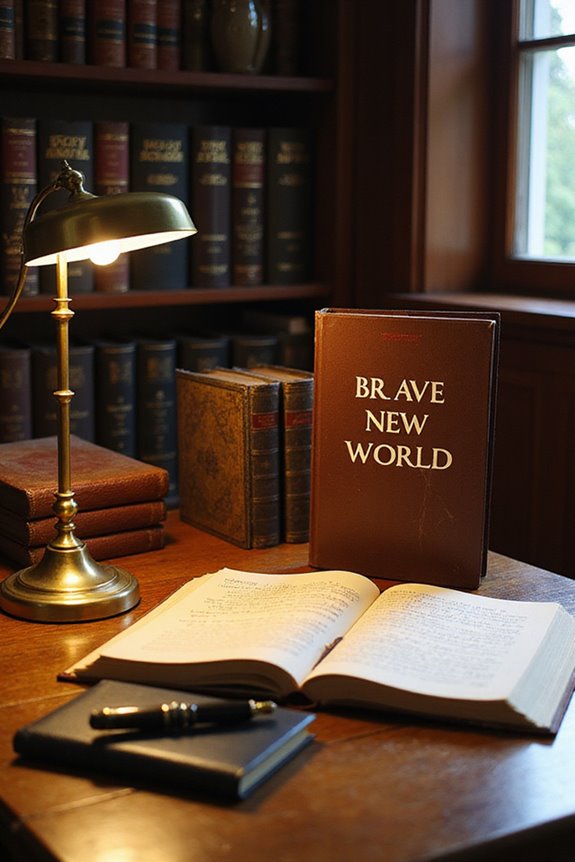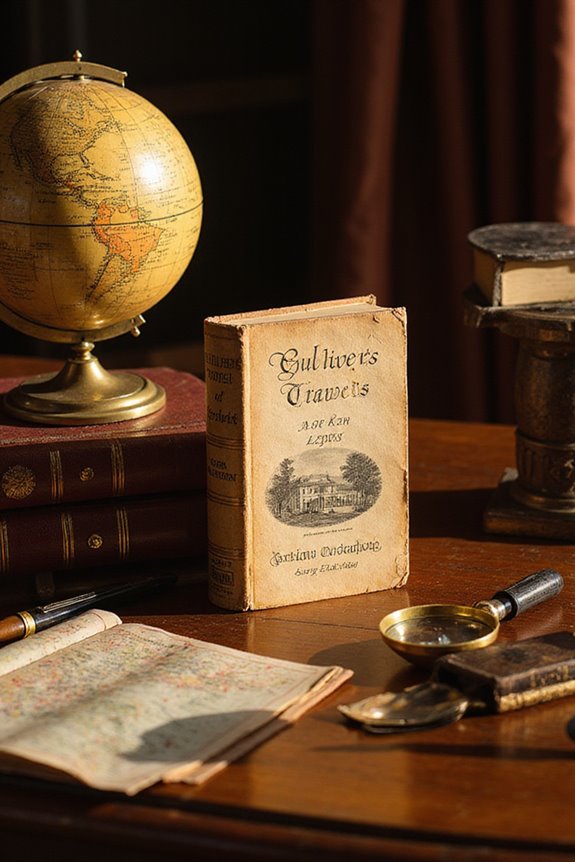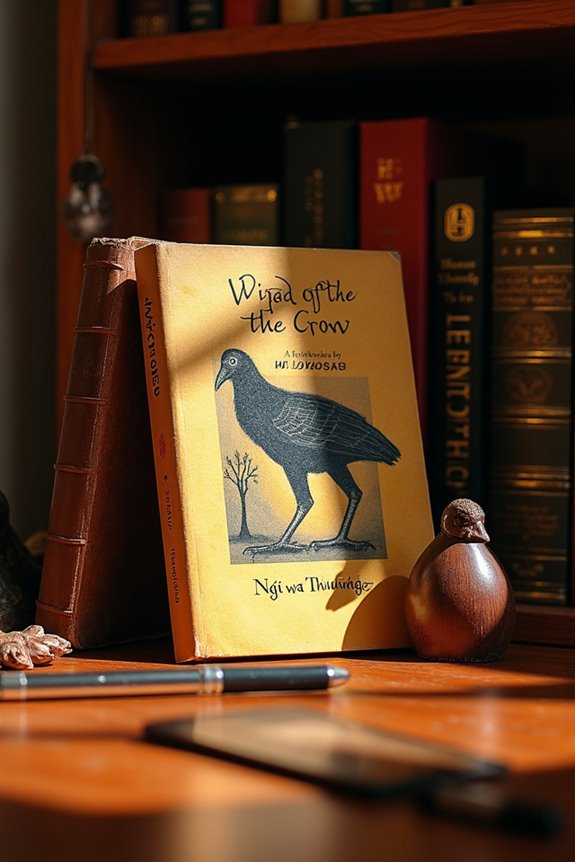When exploring the best political satire books, we can highlight several essential works:
- Animal Farm by George Orwell critiques totalitarianism using allegory.
- Brave New World by Aldous Huxley examines consumerism under authoritarianism.
- Gulliver’s Travels by Jonathan Swift addresses political absurdities and folly.
- Candide by Voltaire mocks optimistic ideologies with ironic elements.
- Catch-22 by Joseph Heller illustrates military bureaucracy’s irrationality.
These books provide insightful commentary on societal norms and governance. Continue to uncover more significant titles in political satire.
Key Takeaways
- “Animal Farm” by George Orwell: A classic critique of authoritarianism illustrating the corrupting influence of power through allegorical animal characters.
- “Catch-22” by Joseph Heller: A darkly humorous exploration of military bureaucracy, highlighting absurdities and moral dilemmas inherent in war.
- “Gulliver’s Travels” by Jonathan Swift: A satirical examination of political absurdity and governance through whimsical narratives and societal critiques.
- “Brave New World” by Aldous Huxley: A dystopian satire that critiques consumer culture and the loss of individuality under totalitarian control masked as pleasure.
- “Look Who’s Back” by Timur Vermes: A contemporary satire on historical ideologies, addressing the absurdity of extremism and its relevance in modern society.
Animal Farm* by George Orwell
“Animal Farm” by George Orwell serves as a profound political satire that critiques the corruption of revolutionary ideals. Through animal symbolism, Orwell illustrates the rise of totalitarianism and the betrayal of revolutionary goals. Key characters, such as Napoleon and Snowball, represent historical figures like Stalin and Trotsky, highlighting historical parallels to the Russian Revolution. The novella was initially rejected for publication due to the political climate that Orwell critiqued through his narrative.
The narrative showcases power corruption through the gradual establishment of a social hierarchy, ultimately leading to oppression. Propaganda techniques, particularly through Squealer, manipulate the truth, reinforcing class struggle among the animals. The story emphasizes betrayal themes, as the initial hopes of equality transform into a regime that mirrors the very tyranny they sought to escape. Additionally, Orwell’s work reflects key themes in political theory that examine the dynamics of power and governance. “Animal Farm” serves as a cautionary political allegory, reflecting the cyclical nature of power abuses.
Brave New World* by Aldous Huxley

Aldous Huxley’s “Brave New World” presents a chilling vision of a society where totalitarian control is masked by the facade of happiness and stability. In this dystopia, engineered pleasure guarantees societal stability, while individuality suppression is rampant. The World State maintains control through scientific rationalism, managing population growth and caste functions to prevent anarchy. Citizens are conditioned for specific roles, reflecting a critique of consumer culture and eugenic elites. Dystopian surveillance keeps the populace compliant, distracted by superficial entertainment. Huxley’s portrayal of a world where discomfort is eliminated by soma reveals the dangers of sacrificing freedom for stability. Ultimately, the novel serves as a powerful satire, illustrating the risks of totalitarian ideology and the loss of human diversity. This critique resonates with themes from moral psychology, emphasizing how ideologies can shape societal structures and individual behaviors.
Gulliver’s Travels* by Jonathan Swift

– The Lilliputians, tiny beings embroiled in petty conflicts, reflect the triviality of real-world political disputes, particularly between the Tories and Whigs. – Gulliver’s attempts to assist them ultimately highlight the irrationality of their governance. – For instance, he faces punishment for a minor offense, underscoring the absurdity of authoritarian rule. – The contrasting societies in the narrative allow us to explore various dimensions of human behavior, revealing the flaws within our political systems, even in exaggerated forms. – This is poignantly illustrated in Gulliver’s first voyage, where he is captured by tiny creatures that represent the pettiness of political squabbles. – This critique of political absurdity resonates with insights from media influence in politics, emphasizing how narratives shape public perception and governance.
This timeless critique remains relevant in today’s political landscape.
Candide* by Voltaire

Key aspects of this work include:
- Voltaire’s critique of optimistic philosophies is central, as he challenges the notion that “all is for the best in this best of all possible worlds.”
- The stark contrast between comedy and tragedy highlights the flaws in societal beliefs and institutions, from organized religion to political oppression.
- Through philosophical ambiguity, Voltaire presents a world filled with evil, yet offers a brief respite in the idealized El Dorado. In a similar vein, historical trends in political literature often reveal the underlying complexities of modern issues.
- His use of irony, such as mocking military punishment with “to encourage the others,” exposes the absurdities of authority.
- The concluding motto, “we must cultivate our garden,” prompts debate on action versus resignation, leaving readers to ponder their interpretations. Additionally, the narrative is influenced by the Seven Years War, reflecting the chaos of Voltaire’s time.
Wizard of the Crow* by NgũGĩ Wa Thiong’O

In exploring Ngũgĩ wa Thiong’o’s *Wizard of the Crow*, we find a profound political satire that critiques authoritarianism and societal decay in a fictional African nation.
- Setting: The narrative unfolds in Aburĩria, plagued by political corruption and systemic decay.
- Characters: Protagonist Kamĩtĩ becomes the “Wizard of the Crow,” embodying revolutionary symbolism amid an identity crisis.
- Themes: The story employs magical realism and absurd humor to expose the absurdities of a dystopian society. The critique of governance structures resonates with the importance of accountability in political theory.
- Critique: The absurdity of the ruler’s grand projects, like “Marching to Heaven,” highlights misplaced priorities amid mass starvation, reflecting the ruler’s oppressive regime.
- Cultural Awakening: The characters’ journeys reflect a collective awakening against oppressive forces, revealing deep societal fractures.
This blend of elements creates a powerful commentary on governance and identity in post-colonial contexts.
Fear and Loathing on the Campaign Trail ’72* by Hunter S. Thompson
Publication Details: Released in 1973, the narrative stems from Thompson’s serialized articles in *Rolling Stone*, establishing him as a critical voice in political journalism.
- The book focuses on the chaotic 1972 U.S. presidential campaign, particularly the Democratic primaries.
- It exemplifies Gonzo journalism, blending fact and fiction with humor and vulgarity to critique political events.
- Thompson champions George McGovern, highlighting his idealism and grassroots efforts amid party disarray.
- He critiques Democratic leadership’s outdated tactics and internal conflicts, emphasizing the clash between idealism and political disillusionment.
- The narrative’s immersive style offers a vivid portrayal of the political landscape, showcasing both McGovern’s struggles and the establishment’s resistance.
- This work remains a significant influence on political reporting and analysis, reflecting ongoing challenges in American politics.
Look Who’s Back* by Timur Vermes
Timur Vermes’ “Look Who’s Back” presents a satirical exploration of how Adolf Hitler navigates modern-day Berlin. The novel employs various satirical elements to critique contemporary German society, showcasing the absurdity of Hitler’s revival. As he interacts with modern Germans, we observe the cultural dissonance between his outdated views and today’s values.
Key aspects include:
- Historical Relevance: The narrative prompts reflections on Germany’s past and the persistence of extremist ideologies.
- Media Critique: Vermes effectively mocks the media’s role in sensationalizing controversial figures for entertainment, similar to how the film “achieved box office success” with Hitler’s character drawing public interest.
- Social Commentary: The book encourages discussions about societal responses to historical ideologies, urging vigilance against repeating past mistakes.
Catch-22* by Joseph Heller
Joseph Heller’s “Catch-22” stands as a landmark work in political satire, similar to how Timur Vermes’ “Look Who’s Back” critiques societal norms through absurdity. Set during World War II, the novel follows Captain John Yossarian, who struggles against the absurd logic of military bureaucracy.
- The term “Catch-22” epitomizes a no-win situation where Yossarian’s plea to avoid flying is deemed insane, thereby forcing him to continue.
- Characters like Colonel Cathcart and Milo Minderbinder illustrate the futility and moral ambiguity of war. Additionally, Yossarian is haunted by the death of fellow soldier Snowden’s tragic end, which serves as a constant reminder of the war’s brutality.
- Heller employs dark humor to highlight the dehumanizing effects of bureaucracy, making it a timeless critique of institutional power.
Ultimately, “Catch-22” remains a pivotal exploration of entrapment in the face of senseless authority.
Slaughterhouse-Five* by Kurt Vonnegut
Kurt Vonnegut’s “Slaughterhouse-Five” offers a profound examination of war’s absurdity, drawing from the author’s own traumatic experiences as a prisoner of war during the Dresden bombing.
- Published in 1969, this novel blends science fiction, autobiography, and historical fiction.
- It critiques the senselessness of war, particularly the devastating firebombing of Dresden, where an estimated 25,000 to 135,000 civilians perished.
- The protagonist, Billy Pilgrim, experiences a non-linear time perception, becoming “unstuck in time” as he oscillates between various moments of his life, including alien encounters.
- The recurring phrase “So it goes” emphasizes a fatalistic acceptance of death and destruction.
- The work satirizes military glorification and societal complacency, establishing itself as a pivotal anti-war statement in American literature.
Frequently Asked Questions
What Defines Political Satire in Literature?
Political satire in literature’s defined by its clever irony usage and humor impact. It critiques societal issues, engaging us while revealing truths about politics. We laugh, yet it urges us to reflect and inspire change.
How Does Satire Influence Public Opinion?
In the landscape of public perception, satire acts like a mirror, reflecting our political realities. It sharpens our critical thinking, urging us to question narratives, engage in discussions, and ultimately reshape our views on governance and society.
Are There Contemporary Examples of Political Satire?
When we look at current examples of modern satire, we see authors like Andy Borowitz and Paul Beatty tackling serious issues. Their sharp wit not only entertains but also provokes thought about our political landscape.
What Techniques Enhance the Effectiveness of Political Satire?
They say laughter’s the best medicine, and we believe irony usage and exaggeration techniques can amplify political satire’s impact. By highlighting absurdities and contrasts, we engage our audience while prompting deeper thought on pressing issues.
How Can Satire Address Social Issues Beyond Politics?
Satire can effectively address social issues beyond politics by weaving social commentary into engaging narratives. Together, we explore cultural critique that reveals societal contradictions, challenges norms, and empowers marginalized voices, fostering critical reflection and civic engagement.

